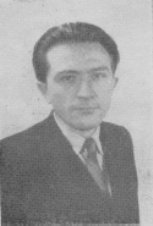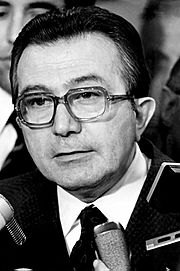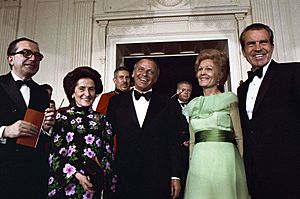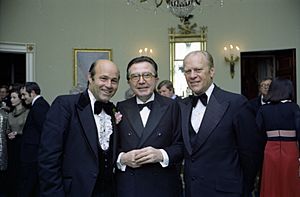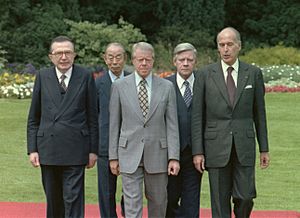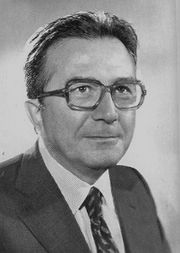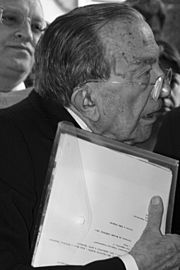Giulio Andreotti facts for kids
Quick facts for kids
Senator for life
Giulio Andreotti
OMI SMOM OCSG OESSH
|
|||||||||||||||||||||||||||||||||||||||||||||||||||||||||||||||||||||||||||||||||||||||||||||||||||||||||||||||||||||||||
|---|---|---|---|---|---|---|---|---|---|---|---|---|---|---|---|---|---|---|---|---|---|---|---|---|---|---|---|---|---|---|---|---|---|---|---|---|---|---|---|---|---|---|---|---|---|---|---|---|---|---|---|---|---|---|---|---|---|---|---|---|---|---|---|---|---|---|---|---|---|---|---|---|---|---|---|---|---|---|---|---|---|---|---|---|---|---|---|---|---|---|---|---|---|---|---|---|---|---|---|---|---|---|---|---|---|---|---|---|---|---|---|---|---|---|---|---|---|---|---|---|---|
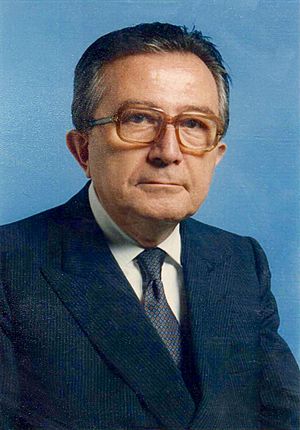 |
|||||||||||||||||||||||||||||||||||||||||||||||||||||||||||||||||||||||||||||||||||||||||||||||||||||||||||||||||||||||||
| Prime Minister of Italy | |||||||||||||||||||||||||||||||||||||||||||||||||||||||||||||||||||||||||||||||||||||||||||||||||||||||||||||||||||||||||
| In office 23 July 1989 – 28 June 1992 |
|||||||||||||||||||||||||||||||||||||||||||||||||||||||||||||||||||||||||||||||||||||||||||||||||||||||||||||||||||||||||
| President | Francesco Cossiga Oscar Luigi Scalfaro |
||||||||||||||||||||||||||||||||||||||||||||||||||||||||||||||||||||||||||||||||||||||||||||||||||||||||||||||||||||||||
| Deputy | Claudio Martelli | ||||||||||||||||||||||||||||||||||||||||||||||||||||||||||||||||||||||||||||||||||||||||||||||||||||||||||||||||||||||||
| Preceded by | Ciriaco De Mita | ||||||||||||||||||||||||||||||||||||||||||||||||||||||||||||||||||||||||||||||||||||||||||||||||||||||||||||||||||||||||
| Succeeded by | Giuliano Amato | ||||||||||||||||||||||||||||||||||||||||||||||||||||||||||||||||||||||||||||||||||||||||||||||||||||||||||||||||||||||||
| In office 30 July 1976 – 5 August 1979 |
|||||||||||||||||||||||||||||||||||||||||||||||||||||||||||||||||||||||||||||||||||||||||||||||||||||||||||||||||||||||||
| President | Giovanni Leone Sandro Pertini |
||||||||||||||||||||||||||||||||||||||||||||||||||||||||||||||||||||||||||||||||||||||||||||||||||||||||||||||||||||||||
| Deputy | Ugo La Malfa | ||||||||||||||||||||||||||||||||||||||||||||||||||||||||||||||||||||||||||||||||||||||||||||||||||||||||||||||||||||||||
| Preceded by | Aldo Moro | ||||||||||||||||||||||||||||||||||||||||||||||||||||||||||||||||||||||||||||||||||||||||||||||||||||||||||||||||||||||||
| Succeeded by | Francesco Cossiga | ||||||||||||||||||||||||||||||||||||||||||||||||||||||||||||||||||||||||||||||||||||||||||||||||||||||||||||||||||||||||
| In office 18 February 1972 – 8 July 1973 |
|||||||||||||||||||||||||||||||||||||||||||||||||||||||||||||||||||||||||||||||||||||||||||||||||||||||||||||||||||||||||
| President | Giovanni Leone | ||||||||||||||||||||||||||||||||||||||||||||||||||||||||||||||||||||||||||||||||||||||||||||||||||||||||||||||||||||||||
| Deputy | Mario Tanassi | ||||||||||||||||||||||||||||||||||||||||||||||||||||||||||||||||||||||||||||||||||||||||||||||||||||||||||||||||||||||||
| Preceded by | Emilio Colombo | ||||||||||||||||||||||||||||||||||||||||||||||||||||||||||||||||||||||||||||||||||||||||||||||||||||||||||||||||||||||||
| Succeeded by | Mariano Rumor | ||||||||||||||||||||||||||||||||||||||||||||||||||||||||||||||||||||||||||||||||||||||||||||||||||||||||||||||||||||||||
|
|||||||||||||||||||||||||||||||||||||||||||||||||||||||||||||||||||||||||||||||||||||||||||||||||||||||||||||||||||||||||
|
|||||||||||||||||||||||||||||||||||||||||||||||||||||||||||||||||||||||||||||||||||||||||||||||||||||||||||||||||||||||||
| Personal details | |||||||||||||||||||||||||||||||||||||||||||||||||||||||||||||||||||||||||||||||||||||||||||||||||||||||||||||||||||||||||
| Born | 14 January 1919 Rome, Kingdom of Italy |
||||||||||||||||||||||||||||||||||||||||||||||||||||||||||||||||||||||||||||||||||||||||||||||||||||||||||||||||||||||||
| Died | 6 May 2013 (aged 94) Rome, Italy |
||||||||||||||||||||||||||||||||||||||||||||||||||||||||||||||||||||||||||||||||||||||||||||||||||||||||||||||||||||||||
| Political party | Christian Democracy (1942–1994) |
||||||||||||||||||||||||||||||||||||||||||||||||||||||||||||||||||||||||||||||||||||||||||||||||||||||||||||||||||||||||
| Other political affiliations |
Italian People's Party (1994–2001) European Democracy (2001–2002) Independent (2002–2008) Union of the Centre (2008–2013) |
||||||||||||||||||||||||||||||||||||||||||||||||||||||||||||||||||||||||||||||||||||||||||||||||||||||||||||||||||||||||
| Spouse |
Livia Danese
(m. 1945) |
||||||||||||||||||||||||||||||||||||||||||||||||||||||||||||||||||||||||||||||||||||||||||||||||||||||||||||||||||||||||
| Children | 4, including Lamberto | ||||||||||||||||||||||||||||||||||||||||||||||||||||||||||||||||||||||||||||||||||||||||||||||||||||||||||||||||||||||||
| Alma mater | Sapienza University of Rome | ||||||||||||||||||||||||||||||||||||||||||||||||||||||||||||||||||||||||||||||||||||||||||||||||||||||||||||||||||||||||
| Profession |
|
||||||||||||||||||||||||||||||||||||||||||||||||||||||||||||||||||||||||||||||||||||||||||||||||||||||||||||||||||||||||
| Signature | |||||||||||||||||||||||||||||||||||||||||||||||||||||||||||||||||||||||||||||||||||||||||||||||||||||||||||||||||||||||||
Giulio Andreotti (born January 14, 1919 – died May 6, 2013) was an important politician and statesman from Italy. He served as the Prime Minister of Italy seven times. This made him one of the longest-serving prime ministers in Italy's history after its unification.
Andreotti was a key figure in the Christian Democracy party. Many people saw him as the most powerful politician during Italy's "First Republic" period. He started his career at a young age. Over 40 years, he held many important government jobs.
He helped guide Italy's move towards the European Union. He also worked to build stronger relationships with countries in the Arab world. Supporters believed he helped Italy change from a mostly farming country into one of the world's biggest economies. Critics, however, said he didn't do enough to stop corruption.
Andreotti strongly supported the Vatican and a capitalist economy. He was against the Italian Communist Party. He also supported a strong European community. He helped create important European funds for economic growth.
Later in his life, Andreotti faced serious accusations. He was accused of having links to organized crime. He was also accused of ordering the murder of a journalist. He was found guilty in one trial, but later cleared of all charges. He famously joked that he had been blamed for everything in Italy, except the Punic Wars.
Besides being prime minister, Andreotti was a senator for life from 1991 until he died. He was also a journalist and author. People sometimes called him Divo Giulio, which means "Divine Julius." This nickname compared him to the Roman leader Julius Caesar.
Contents
- Andreotti's Early Life and Character
- Starting His Political Journey
- First Time as Prime Minister (1972–1973)
- Second Time as Prime Minister (1976–1979)
- Minister of Foreign Affairs (1983–1989)
- Third Time as Prime Minister (1989–1992)
- Later Political Life
- Personal Life
- Death and Legacy
- Images for kids
- See also
Andreotti's Early Life and Character
Giulio Andreotti was born in Rome on January 14, 1919. He was the youngest of three children. His father, a teacher, died when Giulio was only two years old. Andreotti studied law at the University of Rome. He earned top grades.
People described him as calm and humble. He did not use his power to help his own children become famous. He believed in solving problems one step at a time. This was his "art of the possible" approach to politics.
Andreotti was known for being discreet and having a great memory. He also had a good sense of humor. He often made witty remarks to put things into perspective. He was not a physically large man. But he was very skilled at talking and negotiating in politics.
Starting His Political Journey
Andreotti first worked in a tax office while studying law. During this time, he joined the Italian Catholic Federation of University Students (FUCI). This was the only youth group not controlled by Benito Mussolini's fascist government. Many future leaders of the Christian Democracy party were also members.
In 1938, Andreotti met Alcide De Gasperi in the Vatican library. De Gasperi was a key figure in Italian politics. He inspired Andreotti to become active in politics. Andreotti said De Gasperi taught them to find compromises and mediate.
During World War II, Andreotti wrote for a fascist newspaper. But he also worked for a secret anti-fascist newspaper called Il Popolo. In 1943, he helped create the Code of Camaldoli. This document outlined economic policies for the future Christian Democrats. In 1944, he joined the National Council of the new Christian Democracy party. After the war, he led the party's youth organization.
Becoming a Member of Parliament
In 1946, Andreotti was elected to the Constituent Assembly of Italy. This group wrote Italy's new constitution. Alcide De Gasperi supported his election. Andreotti became a close helper and friend to De Gasperi.
In 1948, Andreotti was elected to the Chamber of Deputies. This was Italy's new parliament. He represented the area of Rome–Viterbo–Latina–Frosinone. This region remained his political base for many years.
Andreotti started his government career in 1947. He became the Secretary of the Council of Ministers under De Gasperi. This job gave him many important duties. He had more responsibilities than some full ministers.
Shaping Italian Culture
In 1949, Andreotti was a state undersecretary in charge of entertainment. He set rules for importing films and for how many Italian films had to be shown. He also gave loans to Italian film companies. These rules aimed to protect Italian movies from being taken over by American films.
He wanted to encourage Italian films that were popular with audiences. He famously said, "Less rags, more legs." This meant he wanted fewer serious, realistic films and more comedies and historical dramas.
Key Roles in the 1950s and 1960s
In 1952, Andreotti showed his diplomatic skills. He convinced De Gasperi not to team up with a neo-fascist party. This was important to prevent a Communist party victory in Rome.
He also helped restart the Italian Olympic Committee. It had been shut down after the fall of the Fascist government. In 1953, he helped ban foreign football players from the Italian Serie A league.
After De Gasperi retired in 1953, Andreotti remained Secretary of the Council. In 1954, he became Minister of the Interior. From 1956 to 1958, he was the Finance Minister.
Andreotti began forming his own political group within the Christian Democracy party. This group was supported by the Catholic right wing. In 1958, he became president of the committee organizing the 1960 Summer Olympics in Rome.
In the early 1960s, Andreotti served as Minister of Defence. He was seen as a leader of the right-wing Christian Democrats. He opposed some of the strategies of other party leaders.
In 1968, Andreotti became the leader of the Christian Democracy group in parliament. He held this position until 1972.
First Time as Prime Minister (1972–1973)
In 1972, Andreotti became Prime Minister for the first time. Even when he wasn't prime minister, he was often seen as a powerful figure behind the scenes. His first government lasted only nine days. It was the shortest-lived government in Italian Republic history.
A new election was held in May 1972. Andreotti's party, Christian Democracy, remained strong. He tried to continue a centrist approach, but his government lasted only a year. It fell apart over disagreements about local television reform.
Important Social Changes
Andreotti believed in helping ordinary people. He used price controls on basic foods. He also introduced social reforms to work with labor unions. A law in 1972 gave health insurance to citizens over 65. Another law in 1973 increased social pensions.
As a strong Catholic, Andreotti had close ties with six different popes. He often gave advice to the Vatican, and they usually listened. He updated the relationship between the Catholic Church and the Italian state. This agreement made Catholicism no longer the official state religion. It also made religious education in public schools optional. The Church also accepted Italy's divorce law.
Foreign Relations
Andreotti was a strong supporter of NATO. He visited U.S. President Richard Nixon in 1973. A year earlier, he visited the Soviet Union. This was the first visit by an Italian Prime Minister in over ten years. During his time as prime minister, Italy also built stronger relationships with Arab countries. They increased trade and diplomacy.
Second Time as Prime Minister (1976–1979)
After his first term, Andreotti served as Minister of Defence and Minister of Budget. In 1976, the Italian Socialist Party left the government. This led to new elections. The Italian Communist Party (PCI) grew stronger. Italy was also facing economic problems and terrorism.
The Communist party leader, Enrico Berlinguer, suggested a "Historic Compromise." This meant the Christian Democrats and Communists would work together in government. Andreotti, who was against communism, was chosen to lead this new government. His cabinet, formed in July 1976, was made up only of Christian Democrats. But it had the support of the Communists.
Andreotti's third government was called the "government of no-no confidence." This was because almost all political parties in parliament supported it. Only the neo-fascist party did not.
New Laws and Policies
In 1977, the Italian Parliament passed the Land Use Law. This law placed strict rules on building and land use. In 1978, the Fair Rent Law set rules for rent prices and lease terms. Other laws improved benefits for agricultural workers and linked pensions to industrial wages.
A 1978 law introduced a ten-year plan for housing. The government provided money to regions for public housing. As prime minister, Andreotti also pushed for the creation of an EU Regional Development Fund. Southern Italy greatly benefited from this fund.
In 1977, Andreotti dealt with an economic crisis. He urged Italians to live more simply and passed strict measures to save money. This government fell in January 1978. But a new government was formed in March 1978, again led by Andreotti. This time, the Communist Party also voted to support it.
The Kidnapping of Aldo Moro
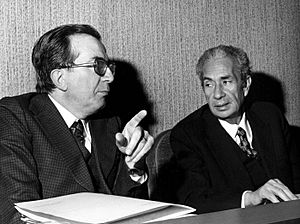
On March 16, 1978, Aldo Moro, the leader of the Christian Democracy party, was kidnapped. Terrorists from the Red Brigades attacked his car in Rome. They killed his bodyguards and took Moro.
During Moro's captivity, Andreotti refused to negotiate with the terrorists. Moro wrote harsh letters against Andreotti while he was imprisoned.
Moro's body was found on May 9, 1978, after 55 days. The Red Brigades had held a "people's court" and demanded a prisoner exchange. After Moro's death, Andreotti continued as Prime Minister. His government passed the Italian National Health Service reform. However, when the Communist Party asked for a bigger role in the government, Andreotti refused. His government ended in June 1979.
Minister of Foreign Affairs (1983–1989)
In 1983, Andreotti became Minister of Foreign Affairs. He served in the government of Bettino Craxi. Craxi was the first Socialist to become Prime Minister of Italy.
The Sigonella Crisis
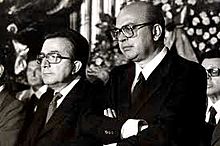
In October 1985, four men hijacked the Italian cruise ship MS Achille Lauro. They killed an American man on board. The hijackers were later caught on an Egyptian plane. U.S. fighter jets forced the plane to land at a NATO air base in Sicily, called Naval Air Station Sigonella.
There was a disagreement between American and Italian authorities. Prime Minister Craxi insisted that Italy had control over the base. Italian police and military faced off against U.S. Navy SEALs. Eventually, the hijackers were handed over to Italian authorities.
Foreign Policy Actions
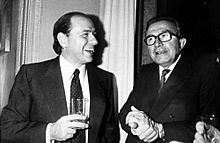
As Foreign Minister, Andreotti encouraged talks between the United States and the Soviet Union. He also worked to improve Italy's ties with Arab countries. This was similar to Craxi's approach.
In 1986, Andreotti told the Libyan Foreign Minister that the United States would bomb Libya the next day. This warning helped Libya prepare. In response, Libya fired missiles at the Italian island of Lampedusa. But the missiles landed in the sea and caused no harm.
Andreotti also helped create the "CAF triangle." This was a political alliance with Craxi and another Christian Democrat leader, Arnaldo Forlani. They worked together against the power of the Christian Democracy party's national secretary, Ciriaco De Mita.
After Craxi resigned in 1987, Andreotti remained Foreign Minister. He served in the governments of Amintore Fanfani and De Mita. In 1989, when De Mita's government fell, Andreotti became Prime Minister again.
Third Time as Prime Minister (1989–1992)
Andreotti became Prime Minister for the third time on July 22, 1989. His government faced many challenges. He decided to stay in power even when some ministers left. This was after a law was passed that favored private TV channels. This choice caused new tensions with Bettino Craxi. Craxi's party left their government in 1991. Andreotti then formed a new government with different parties.
In 1990, Andreotti revealed the existence of Operation Gladio. This was a secret NATO operation in Italy during the Cold War. Its goal was to prepare for armed resistance if the Warsaw Pact invaded.
During his time as prime minister, Andreotti often disagreed with Italy's President, Francesco Cossiga.
Negotiations for the European Union
In 1990, Andreotti helped all parties agree on a timeline for the Maastricht Treaty. This treaty led to the creation of the Economic and Monetary Union of the European Union. Italy wanted a strong economic union. Britain's Margaret Thatcher wanted a system where currencies competed. Germany was unsure about the plan without Italy making economic reforms.
As President of the European Council, Andreotti convinced Germany to agree. He promised that Italy would make strict changes to its public finances. Critics later wondered if Andreotti truly intended to keep this promise.
Resignation and Later Years
In 1992, Andreotti resigned as prime minister. He was the last Christian Democratic Prime Minister of Italy. The year before, President Cossiga had made him a Senator for Life. Andreotti was considered a strong candidate to become President of Italy in 1992.
However, accusations against him made it difficult. The murder of anti-mafia judge Giovanni Falcone also affected the election.
Later Political Life
The Mani Pulite Investigations
In 1992, a major investigation called Mani pulite (Clean Hands) began in Milan. It uncovered widespread corruption at the highest levels of government. Many politicians were arrested or resigned. The Christian Democracy party faced many scandals. It was eventually dissolved in 1994. Many politicians accused during these investigations were later found not guilty.
After the Christian Democracy Party
The Christian Democracy party lost many elections. To change its image, the party's last secretary changed its name to the Italian People's Party (PPI). Andreotti joined this new party.
Later, Andreotti left the People's Party. In 2001, he joined a smaller Christian democratic party called European Democracy. He became a very important member of this party.
In the 2001 election, the party won only two seats in the Senate. In 2002, it merged with other parties to form the Union of Christian and Centre Democrats. Andreotti did not join this new party.
In 2006, Andreotti ran for President of the Italian Senate but did not win. In 2008, he joined a different parliamentary group in the Senate.
Personal Life
On April 16, 1945, Andreotti married Livia Danese. They had two sons and two daughters. His wife passed away in 2015.
Death and Legacy
Andreotti once said that other people's opinions didn't bother him much. He also joked that "In any case, a few years from now, no one will remember me." He died in Rome on May 6, 2013, at the age of 94. He had been suffering from breathing problems.
The BBC called him "one of the most prominent political figures of post-war Italy." The New York Times said his career was like "a history of the republic." The Mayor of Rome, Gianni Alemanno, announced his death. He said Andreotti was "the most representative politician" Italy had known recently.
Conspiracy Theories and Nicknames
Andreotti was sometimes linked to various conspiracy theories. People suggested he was a secret leader behind the Propaganda Due Masonic Lodge. This was a secret group of powerful people. They were thought to be trying to stop the Italian Communist Party from gaining power.
He was also linked to Operation Gladio. This was a secret NATO organization meant to fight a Soviet invasion.
Andreotti was also accused of being involved in other major events. However, he was cleared of these accusations.
His image as a clever and powerful politician influenced fictional characters. A famous quote attributed to him was: "Power wears out those who don't have it." This line was used in the film The Godfather Part III.
His political opponent, Bettino Craxi, nicknamed him Belzebù (which means Beelzebub or "The Devil himself"). Other nicknames included "The Black Pope" and "The Hunchback" (because of his posture).
In 2008, a film called Il Divo was made about Andreotti. It showed him as a smooth but unsympathetic person. People around him often met bad ends. Andreotti reportedly got angry when he first saw the film. But he later joked about it, saying he was happy for the producer.
Andreotti was also shown in the 2020 film Rose Island.
Images for kids
See also
 In Spanish: Giulio Andreotti para niños
In Spanish: Giulio Andreotti para niños


